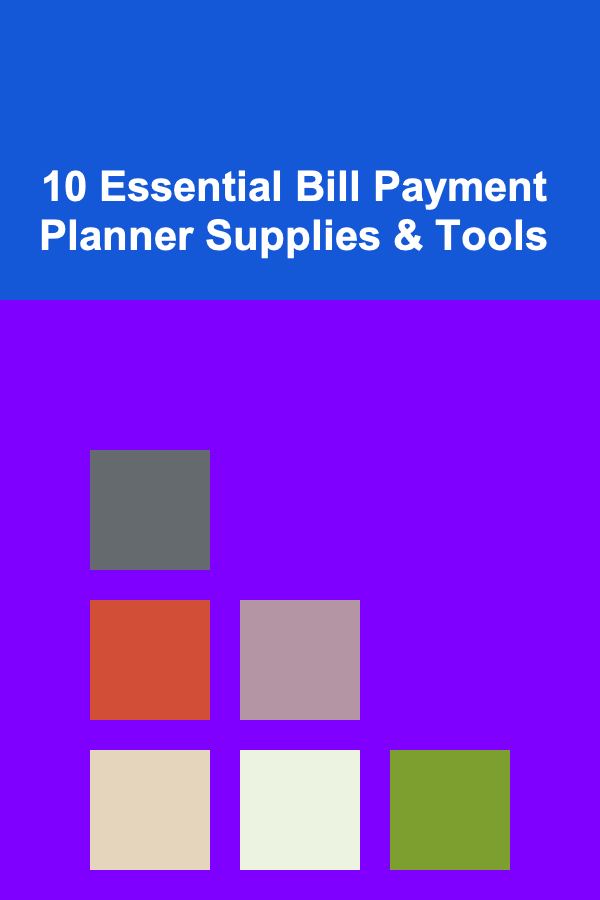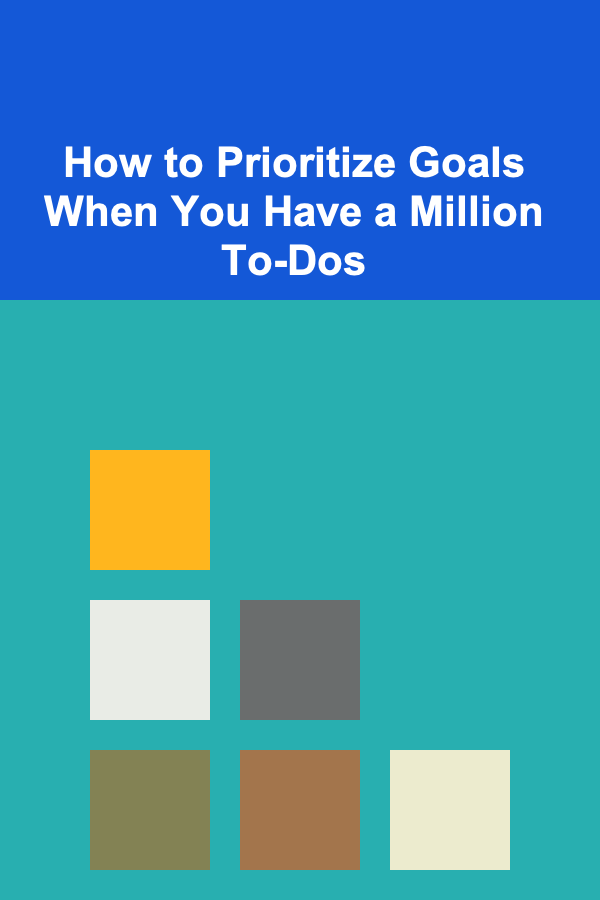
10 Essential Bill Payment Planner Supplies & Tools
ebook include PDF & Audio bundle (Micro Guide)
$12.99$7.99
Limited Time Offer! Order within the next:

Managing finances can often feel overwhelming, especially when it comes to keeping track of bill payments. With the ever-increasing number of digital subscriptions, utility bills, and credit card payments, it's essential to have an organized system that can help keep everything on track. Enter the bill payment planner---a tool designed to ensure that your bills are paid on time and that your finances stay under control. But to make the most of your planner, you'll need the right supplies and tools to stay organized. In this article, we will explore the 10 essential bill payment planner supplies and tools that can help you stay on top of your financial obligations.
Bill Payment Planner or Journal
The foundation of any bill payment planning system is the planner or journal. This is where all your bill-related information will be recorded, from payment due dates to amounts owed. You can choose a physical planner or a digital one, depending on your preference.
Key Features to Look For:
- Monthly Layout: This allows you to see all your upcoming bills at a glance.
- Sections for Notes: Helps track details such as confirmation numbers, late fees, or adjustments.
- Customizability: Look for planners with space to add categories, reminders, or notes that suit your unique needs.
A physical planner might appeal to those who prefer writing things down, while digital planners (apps or spreadsheets) are better suited to those who like to automate and track payments digitally.
Budgeting Tools
A bill payment planner is most effective when paired with a comprehensive budgeting system. By keeping track of your income, expenses, and savings, you'll better understand how much money you have to allocate toward bill payments each month.
Recommended Budgeting Tools:
- Envelope System: A traditional approach where you allocate cash for different spending categories.
- Budgeting Apps: Apps like YNAB (You Need A Budget), Mint, or PocketGuard help you keep track of your income and expenses automatically, making it easier to ensure that your bills are getting paid on time.
- Spreadsheets: A simple Google Sheets or Excel template can be a low-tech but highly effective tool for budgeting.
Pairing your bill payment planner with a budgeting tool will give you the clarity to avoid late fees and penalties while staying financially healthy.
Bill Payment Calendar
A bill payment calendar is crucial for tracking due dates and ensuring you never miss a payment. You can either use a physical calendar or a digital one, depending on your preference. Setting up reminders for each bill due date is essential to avoid late fees and interest charges.
Tips for an Effective Bill Payment Calendar:
- Set Reminders: Use digital tools like Google Calendar or Apple Calendar to set up recurring reminders. For physical planners, make sure to mark the payment due dates clearly.
- Track All Bills: Include rent/mortgage, utilities, credit cards, subscriptions, loans, and any other recurring payments in your calendar.
- Visual Cues: Color coding or adding symbols for priority bills or deadlines can make it easier to spot time-sensitive payments at a glance.
Having a bill payment calendar ensures that you have an overview of your financial obligations at any given time, making it easier to manage your cash flow.
Expense Tracker App
While a budgeting tool helps you allocate your money, an expense tracker app can help you track your actual spending in real-time. These apps sync with your bank accounts and credit cards to track every purchase you make, categorizing each expense and helping you stay on budget.
Popular Expense Tracker Apps:
- Expensify: Perfect for tracking receipts and spending.
- EveryDollar: Offers an easy-to-use platform to track both your expenses and bills.
- Spendee: A visually appealing app for managing finances and tracking expenses.
These apps are especially helpful if you need to track expenses across different accounts and ensure that your bill payments don't surpass your available funds.
Bill Payment Envelopes or Folders
Physical bills can pile up quickly if you don't have a system for organizing them. Using bill payment envelopes or folders can help you separate your bills by due date, type, or status (paid, pending, etc.).
Organizational Options:
- File Folders: Use separate folders for each type of bill (e.g., utilities, credit cards, subscriptions).
- Hanging Folders: Ideal for a more permanent storage system, keeping bills neatly organized and easy to retrieve.
- Envelopes: Keep track of bills by due date with color-coded envelopes.
Having a physical system to organize your bills helps reduce stress and prevents missing payments.
Online Bill Payment Services
Online bill payment services allow you to pay your bills directly from your bank account or credit card without the need to write checks or visit each individual company's website. Many banks offer this service for free, but there are also third-party platforms like Prism or Truebill that help track your bills and automate payments.
Benefits of Online Bill Payment Services:
- Automation: Set up recurring payments to ensure your bills are paid on time, every time.
- Tracking: Some services offer bill reminders and let you track past payments.
- Secure Payments: Payments are processed through secure platforms, reducing the chance of fraud or error.
Using online bill payment services not only saves you time but also adds an extra layer of convenience and security to your financial management.
Pen and Highlighter Set
Whether you prefer physical or digital bill tracking, a good pen and highlighter set are invaluable for staying organized. Use the pen for writing in your bill payment planner and the highlighter to emphasize due dates, payment amounts, or special instructions.
Suggested Usage:
- Highlighter: Mark the most important bills that are due soon, such as rent or credit card payments, to prioritize them.
- Pen: Write down confirmation numbers, account numbers, and any notes about the bill (like changes in payment amounts or fees).
The act of physically writing things down or highlighting important information can reinforce your commitment to paying your bills on time.
Bill Payment App (Mobile)
For those always on the go, using a bill payment app on your mobile device can be incredibly convenient. Apps like Mint , Bill.com , or Check allow you to make payments, track due dates, and even receive reminders from your smartphone, keeping everything in one place.
Features to Look For:
- Automated Payments: Some apps allow you to automate your bill payments entirely.
- Expense Monitoring: Track how much you've spent across all categories, including your bills.
- Payment History: Keep track of past payments for easier budgeting and record-keeping.
Having an app that integrates with your bank accounts and billers makes it easy to pay on the go and stay up-to-date on your financial commitments.
Personal Finance Software
If you're looking for a more comprehensive tool to manage your finances, personal finance software like Quicken or Mint can offer in-depth insights into your bill payments, as well as budgeting, investing, and savings tools.
Why Use Personal Finance Software?
- All-in-One Solution: Manage all aspects of your finances, including bill payments, investments, and savings goals.
- Detailed Reports: Generate reports to understand where your money is going and spot opportunities for savings.
- Bill Payment Tracking: Many personal finance software solutions can sync with your bank accounts to track your bill payments and even set up reminders.
If you need an all-encompassing financial management system, personal finance software can be a great option to help you stay on top of everything.
Paper Shredder
Once you've paid a bill, it's essential to keep records but also to safely dispose of any sensitive information. A paper shredder can help you eliminate old bill statements or documents that contain personal information.
Benefits of a Paper Shredder:
- Security: Protect your personal information from identity theft.
- Organization: Clear out old bills and receipts that are no longer necessary.
- Efficiency: Quickly shred old documents without manually tearing them up.
By using a paper shredder, you ensure that your finances are not only organized but secure as well.
Conclusion
Managing bill payments doesn't have to be stressful. With the right tools and supplies, you can stay on top of your financial obligations and avoid late fees or penalties. From a reliable bill payment planner and budgeting tools to online payment services and secure document shredders, these essentials will help streamline your financial management and give you peace of mind. Choose the tools that work best for your lifestyle and start organizing your finances today!
Reading More From Our Other Websites
- [Hiking with Kids Tip 101] Nature Walks for Little Feet: Top Easy Hikes for Toddlers
- [Home Budget 101] How to Avoid Debt While Managing Your Home Budget
- [Tie-Dyeing Tip 101] DIY Tie-Dye Gifts: Personalized Colors for Every Occasion
- [Home Staging 101] How to Stage Your Home to Sell in a Competitive Market
- [Hiking with Kids Tip 101] Top Kids Hiking Backpacks for Every Trail Adventure
- [Home Budget Decorating 101] How to Choose Budget-Friendly Rugs to Elevate Your Home's Style
- [Personal Care Tips 101] How to Use Conditioner to Revitalize Dry, Brittle Hair
- [Home Holiday Decoration 101] How to Create a Kid-Friendly Holiday Decor Setup
- [Hiking with Kids Tip 101] Top & Easy Mountain Trails Perfect for Young Adventurers
- [Personal Care Tips 101] How to Apply Aftershave to Keep Your Skin Cool After Shaving

How to Market and Sell Digital Art Portfolios: An Actionable Guide
Read More
How to Get Started with Cloud Gaming
Read More
How to Succeed in Phone Interviews: A Comprehensive Guide
Read More
How to Prioritize Goals When You Have a Million To-Dos
Read More10 Tips for Maximizing Your Fertility Tracker Planner
Read More
10 Essential Financial To-Do List Items for Recent College Grads
Read MoreOther Products

How to Market and Sell Digital Art Portfolios: An Actionable Guide
Read More
How to Get Started with Cloud Gaming
Read More
How to Succeed in Phone Interviews: A Comprehensive Guide
Read More
How to Prioritize Goals When You Have a Million To-Dos
Read More10 Tips for Maximizing Your Fertility Tracker Planner
Read More